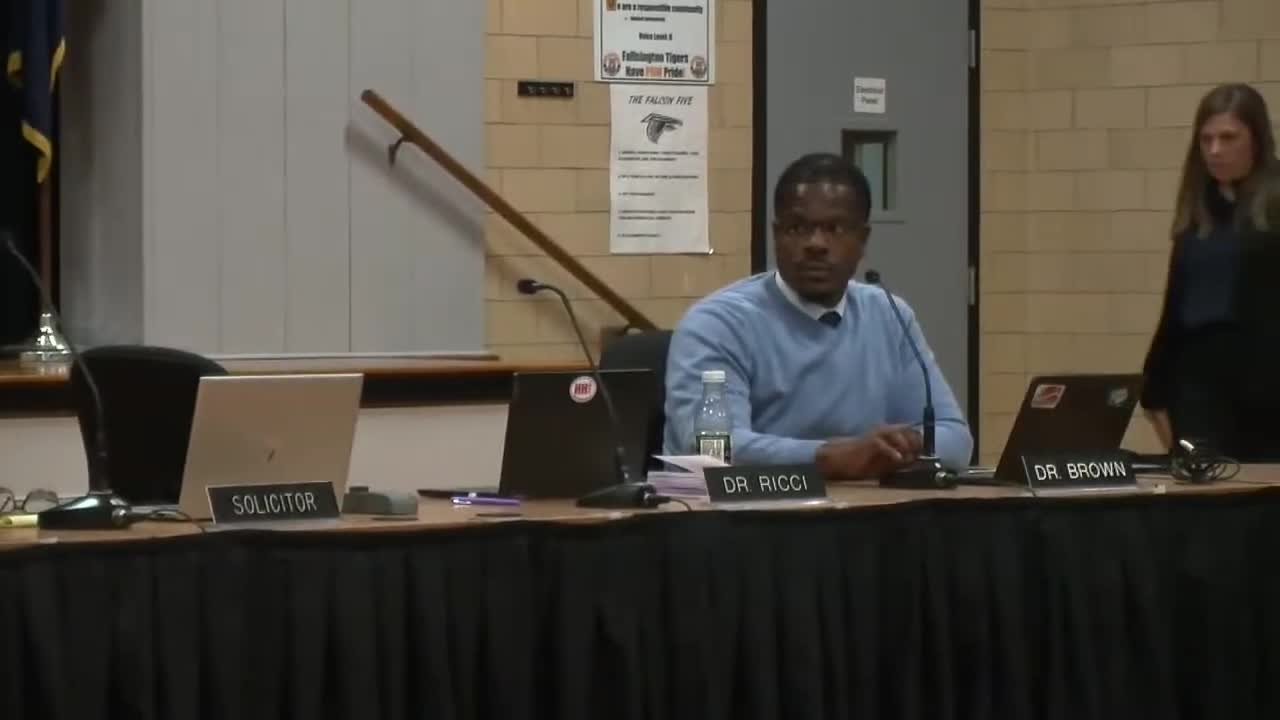Pennsbury officials reaffirm $269.5 million cap for new high school; outline bond schedule and estimated tax impacts
Get AI-powered insights, summaries, and transcripts
Subscribe
Summary
Superintendent Dr. Smith told the Pennsbury School Board on Oct. 16 that the district has approved a maximum cost of $269,500,000 for the Pennsbury High School project and that the work will be funded through a series of bonds issued over several years.
Superintendent Dr. Smith told the Pennsbury School Board on Oct. 16 that the district has approved a maximum cost of $269,500,000 for the Pennsbury High School project and that the work will be funded through a series of bonds issued over several years.
"The Pennsbury High School project is projected to be 269 mill $500,000. That is what the board has approved," Dr. Smith said during the meeting, adding the district plans to draw bond proceeds as needed rather than borrowing the entire amount up front.
Dr. Smith said bonds will be issued from 2024 to 2029 to limit taxpayers' exposure to current interest rates and to take advantage of potential future rate declines. The superintendent noted the district must stay within Pennsylvania's Act 1 index limits and that the debt service will be part of the general fund.
Why it matters: The high school project is the largest capital undertaking discussed in recent district planning and the board presented specific millage examples to show how the cost could affect typical property owners. Board leaders emphasized the district's intent to manage borrowing timing and to pursue grants and donations to reduce net impact.
Details and district examples Dr. Smith provided example calculations using local assessed values to show projected tax changes under a worst‑case scenario that assumes annual Act 1 index increases. Using a Levittown house with an assessed value the superintendent identified as $21,600, Dr. Smith said the district's example yields a net tax increase of roughly $130.56 for the homeowner under the projected schedule after homestead rebate adjustments. For a median assessed value example (noted in the presentation as roughly $32,000 assessed, roughly a $500,000 market value), Dr. Smith showed staged increases of roughly $271 and then $272 in successive years under the maximum index projections; a higher assessed example ($50,000 assessed, ~$850,000 market) showed increases of about $448 and $425 in the next two years under the same assumptions.
Dr. Smith stressed the Act 1 index is a legal maximum rather than a target and that the district will seek savings and grants before reaching that cap: "Act 1 is not a target. It is a maximum. Our goal is to continue to savings to reduce spending and only go to the maximum if absolutely necessary," he said.
Board officials also described tax relief steps. The superintendent and staff pointed attendees to the district website for information on the district's senior citizen property tax rebate program and on homestead exclusion forms, and said the district will try to pursue grant or philanthropic offsets for construction startup costs and equipment like scoreboards.
Public reaction at meeting Several public commenters challenged the district's presentation. Andrew Dell, a Falls Township resident and school board candidate, criticized the project budget and expressed distrust of the district’s cost controls, saying, "It's amazing how you guys can say, well, it's not gonna be a dime over 269,000,000 when you guys can't keep 1 project under budget." He raised concerns about potential future requests for additional taxpayer funds if costs rose.
Resident Robert Abrams said he believed the proposed construction site included hazardous‑waste contamination and warned disposal could increase project costs; he cited chemical names and lab‑sampling concerns in his remarks. A student speaker, Joseph (Joey) Weisner, told the board he was worried about health risks from artificial turf and asked the district to consider safety for players and spectators.
What the board approved that night The board approved its consent agenda, which included multiple finance and contract items tied to district operations and capital planning (see "Votes at a glance" article for the consent list and roll call). The high school project cap, bond strategy and tax illustrations were presented as administration plans and background; no separate motion to change the project's approved maximum amount was taken during the Oct. 16 meeting.
Looking ahead Dr. Smith said additional public materials, reports and project documents are available on the district website’s dedicated high school project page and encouraged residents to consult that page for updates. He also said the board will continue meetings and will consider bond issuance timing as market conditions evolve.
